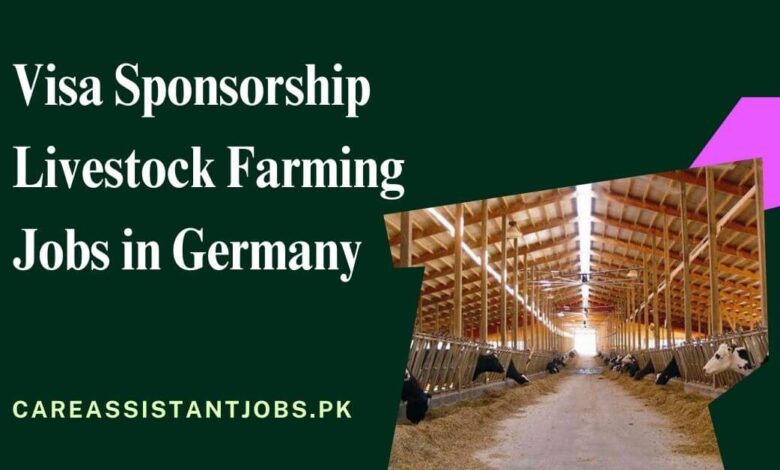Visa Sponsorship Livestock Farming Jobs in Germany 2025

Germany, a nation renowned for its robust economy and diverse business opportunities, also offers opportunities for individuals with a passion for agriculture, notably animal husbandry. Germany has a well-established agrarian division, and livestock husbandry is a substantial component of its economy.
The nation is distinguished by its stringent regulations regarding animal welfare and its cost-effective agricultural practices. In Germany, cattle, swine, poultry, and other animals are bred for food, with a focus on providing high-quality care and moral standards.
Check Also: Visa Sponsorship Cook Jobs in Germany – Apply Now
Demand:
The necessity of adhering to stringent directives and maintaining high-quality standards is the primary factor driving the demand for skilled laborers in the livestock husbandry sector. As Germany continues to emphasize ethical and practical agricultural practices, there is a consistent demand for individuals with expertise in farm management, veterinary care, and animal husbandry.
Sponsorship of Visas for Jobs in Livestock Farming:
This process frequently involves obtaining a critical work visa in order to secure employment in livestock husbandry in Germany. Employers who comprehend the importance of foreign expertise in upholding the nation’s rigorous agricultural standards frequently advocate for visas. The EU Blue Card is intended for non-EU laborers who are exceedingly qualified, whereas the German Work Searcher Visa is intended for individuals who are seeking employment.
Benefits:
- Stable and Expanding Sector: Livestock husbandry serves as a critical component of Germany’s agricultural industry, contributing to the nation’s stable employment landscape. Germany is renowned for its robust and continuously innovative agrarian sector.
- Job Security: As a result of the consistent demand for livestock products including meat, dairy, and eggs, employment in livestock husbandry generally provides greater job security than in certain other sectors.
- Competitive Salaries: Livestock farming careers in Germany frequently offer competitive salaries, particularly for individuals who possess the necessary expertise and managerial experience in the field of animal husbandry.
- Competitive Salaries: Germany is renowned for its technological prowess in the agricultural sector, encompassing livestock husbandry as well. This sector provides its employees with access to cutting-edge farming techniques, equipment, and apparatus, all of which can increase output and efficiency.
- Provision of Training and Education Opportunities: A considerable number of livestock farming employers in Germany offer their staff members training and education opportunities to augment their expertise and understanding in domains including sustainable farming practices, agricultural technology, and animal welfare.
- Healthcare and Social Benefits: Employers in Germany are customarily obligated to furnish healthcare coverage and social benefits to their workforce, encompassing agricultural workers as well. This mandate guarantees access to essential healthcare services and financial security.
- Work-Life Balance: Employment in livestock husbandry in Germany frequently provides opportunities for time off and consistent work hours, which contribute to a healthy work-life balance. This allows employees to engage in personal pursuits and leisure time beyond the workplace.
- Contribution to Sustainable Agriculture: Germany actively promotes and supports sustainable agriculture, demonstrating a profound commitment to environmental stewardship. Livestock workers are afforded the chance to actively participate in sustainable initiatives, including but not limited to organic cultivation, animal welfare standards, and conservation endeavors.
- Rural Living: Numerous livestock ranches in Germany are situated in rural regions, providing employees who appreciate country life with a tranquil and organic atmosphere. This may appeal to those in search of a more tranquil way of living distant from metropolitan areas.
- Community Engagement: Livestock farming frequently cultivates a sense of camaraderie and solidarity among its employees, in addition to among the farmers and residents in the vicinity. Strong social connections and support networks may develop as a result in rural communities.
Qualifications and Skills:
- Relevant Education: Livestock husbandry positions frequently necessitate a background in agriculture, veterinary science, or a related field.
- Work Experience: In Germany, managers typically prioritize candidates who have experience in animal husbandry. A substantial advantage may be provided by prior work experience.
- Language Capability: While English may be sufficient for certain positions, proficiency in German is exceedingly advantageous for effective communication in both professional and personal contexts.
- Visa Requirement: Verify and satisfy the visa requirements for employment in Germany. This may involve the acquisition of a Blue Card or a work visa for highly talented employees.
- Health Protections: It is essential for individuals employed in Germany to have a sufficient amount of health insurance coverage. Ensure that you have the requisite health insurance policies in place.
- Job Offer: It may be essential to obtain a job offer from a German manager. The likelihood of obtaining a work visa is increased by the presence of a concrete offer.
- Financial Stability Proof: The provision of financial stability proof demonstrates your ability to sustain yourself in Germany. This may include confirmation of accommodation and bank statements.
- Cultural Flexibility: Exhibit your ability to adapt to the German work culture and way of life. Employers frequently prioritize social adaptability.
- Valid Passport: Guarantee that your visa is valid for the duration of your intended stay in Germany. Verify the specific requirements for passport validity.
- Networking: Your employment prospects can be significantly enhanced by establishing professional associations within the German agricultural sector. Attend industry events and establish connections with professionals to broaden your network.
Obligations:
- Animal Welfare: Guarantee the health and welfare of animals by providing them with appropriate nutrition, housing, and medical care. This involves the observation of the health and behavior of animals.
- Breeding Management: Oversee the delivery of animals, manage reproduction forms, and implement breeding programs. Maintain precise records of reproductive activities.
- Management of Herd Health: Vaccination schedules, disease prevention measures, and well-being guidelines are implemented to ensure the animals’ overall health.
- Feeding and Nutrition: Develop and implement balanced feeding strategies for various phases of animal development. Monitor the condition of the feed and adjust the rations as necessary.
- Facility Upkeep: Conduct routine inspections and maintenance of farm infrastructure, including equine shelters, walls, and equipment. In order to guarantee a secure and efficient work environment, promptly address any necessary repairs.
- Data Acquisition: Maintain comprehensive records of animal activities, including pregnancies, fatalities, and medications for well-being. Exact record-keeping is essential for the management and compliance of farms.
- Movement and Management of Herds: Ensure that the development of animals is coordinated for a variety of purposes, including transportation, reproduction, and sustenance. Conduct appropriate animal handling procedures to reduce the tension experienced by animals.
- Environmental Compliance: Comply with sustainable cultivation practices and environmental regulations. Supervise the disposal of waste and employ strategies to reduce the farm’s biological impact.
- Equipment Operation: Operate and maintain farm machinery and equipment, including tractors, drainage machines, and feeding systems.
- Teamwork: Collaborate with farm staff, veterinarians, and other experts to ensure the efficient administration of the animal farm.
- Market Awareness: Stay informed about the demand for animal items, market trends, and estimations. Modify agricultural practices in accordance with market conditions.
- Ongoing Education: Ensure that you are informed about the latest developments in the industry, technology, and animal husbandry practices. Engage in substantial seminars or training sessions to enhance one’s abilities.
Application Procedure of Visa Sponsorship Livestock Farming Jobs in Germany 2025:
- Search for livestock farming positions in Germany by contacting farms directly, using online work portals, or visiting agricultural websites.
- Organize your curriculum vitae to highlight your education and skills, as well as your significant experience in animal husbandry.
- Submit your visa application to the German Consulate or Embassy in your country of residence. Ensure that all required documentation is submitted and that the appropriate fees are paid.
Conclusion:
Livestock farming occupations in Germany provide an intriguing opportunity to experience the country’s rich agricultural heritage and contribute to a thriving industry. Individuals who possess a combination of practical experience, pertinent capabilities, and a dedication to sustainable farming may explore rewarding career paths in this division, which includes the benefit of visa sponsorship to expedite their professional development in Germany.
Frequently Asked Questions:
How do I get an unskilled job in Germany?
Local Employment Agencies: Contact local employment agencies or job centers in the area where you plan to work. They may have listings for unskilled jobs or guide available opportunities. Networking: Tap into your personal and professional network to inquire about job openings or recommendations.
Is farming profitable in Germany?
On average, over the last five years (2013–2014–2017–2018), full-time farms generated an annual profit of approximately 52,400 euros. Calculated in terms of each family member that works on the farms, this equates to an income of around 31,800 euros.
Are agriculture jobs in demand in Germany?
With a high demand for skilled and unskilled laborers in agriculture, Germany offers attractive salary packages, job security, and a vibrant work environment.



